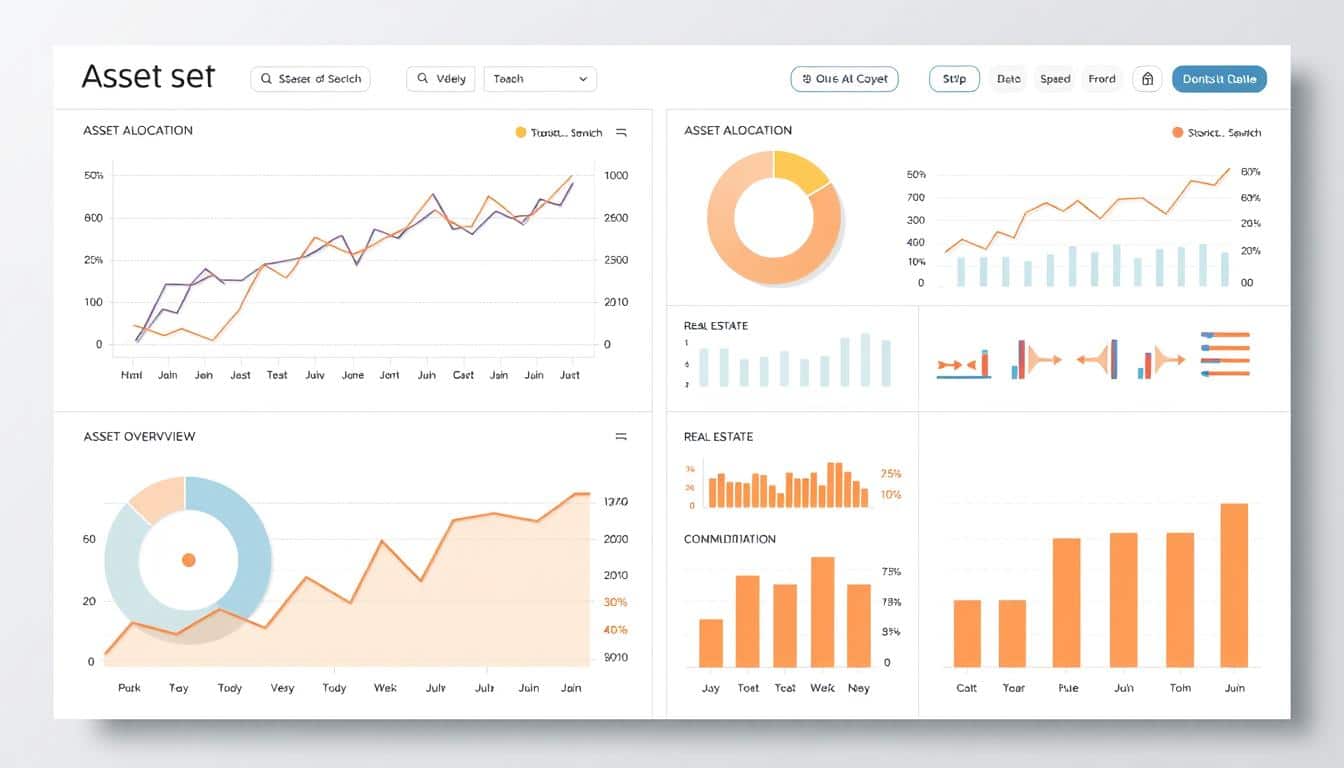In today’s world, managing debt is key to financial freedom. Knowing the best debt strategies helps people control their money. This reduces stress and leads to a safe future.
Good debt management keeps your credit score up and lowers bankruptcy risk. Learning and using the right methods can make debt a way to grow wealth.
Anúncios
Understanding Debt: The Basics
Debt means money owed to others, like banks or family. Knowing about debt is key for handling money well. Debt is mainly in two kinds: secured and unsecured. It’s also important to know the difference between good and bad debt.
What Constitutes Debt?
Debt is when you borrow money from someone else. This might be from a bank, a friend, or using a credit card. You must pay back this money with certain terms, often including interest. Knowing about debt is the first move to manage your money.
Types of Debt: Secured vs. Unsecured
There are two big types of debt: secured and unsecured. Secured debt has collateral behind it, like a house or car. If you can’t pay, the lender can take the collateral. Unsecured debt has no collateral, like credit card or personal loans. This kind carries more risk for lenders, so interest rates are higher.
Good Debt vs. Bad Debt
It’s important to know the difference between good and bad debt. Good debt can help you build wealth, like student loans or mortgages. This kind of debt can benefit your financial future. Bad debt, like credit card debt, doesn’t help you grow financially. Knowing this can shape your financial choices.

The Impacts of Debt on Your Financial Future
Debt changes your money situation a lot. It makes a cycle where much of your money goes to paying it off. This not only stops you from saving but might also make you borrow more, which can lead to big debt problems.
Financial Strain and Credit Score Consequences
Debt has a big effect on credit scores. Owing a lot and missing payments can make your score go down. As money problems grow, getting loans or renting property gets harder. A bad credit score affects you for a long time, so it’s important to be smart about handling debt.
Emotional and Physical Health Effects
Money worries cause stress that hurts your emotions and body. Constant worry about bills can lead to severe mental health problems. It can harm relationships and how you enjoy life. Also, your body might suffer from stress-related issues like high blood pressure or trouble sleeping. It’s key to take care of the emotional and physical impacts of debt for your health and recovery.
Budgeting: The Foundation of Financial Management
Effective budgeting is key to good financial management. It helps you understand your money better, showing what you earn and spend. This understanding helps you manage debts well.
By knowing what you need versus what you want, you make smarter choices. This keeps your finances solid.
Creating a Comprehensive Budget
Start your budget by looking at your monthly income and fixed costs. Use budget tools or apps to make it simpler. These help you see where your money goes.
Set goals that are realistic. Spend wisely on what you need and save some. This way, you spend and save wisely, improving your money management.
Tracking Income and Expenses
Keeping an eye on your money is crucial for a budget to work. Check your spending and earning often. Use spreadsheets or budget apps to stay organized.
This shows you how you’re using your money and where you can save. Staying on top of your spending helps you adjust your budget as needed.
Debt Management Strategies to Regain Control
Debt repayment methods are key for gaining back financial stability. There are two main strategies: the avalanche and snowball methods. Each strategy has its benefits to fit different financial needs and mental preferences.
Prioritizing Debt Repayment: Avalanche vs. Snowball Methods
The avalanche method targets debts with the highest interest rates first. This way, you pay less interest over time. It can get you out of debt faster. Then there’s the snowball method, which focuses on clearing smaller debts first. This strategy gives a sense of achievement early on. It can boost motivation to pay off bigger debts.
Which debt repayment method you choose depends on what suits you best. Some might like the avalanche method because it’s logical. Others may prefer the snowball approach for its quick wins.
Negotiating Lower Interest Rates with Creditors
Negotiating for lower interest rates with creditors is another smart move. A lower rate means you pay less money overall. It also means you can get out of debt faster. Presenting a strong case to your creditors helps. Show them you’re committed to paying off your debt.
Using these strategies in your debt management plan can make a big difference. They can help take back control over your finances.
Debt Consolidation: A Simplified Approach
Debt consolidation makes handling multiple debts easier. It merges them into one payment. This approach includes personal loans or balance transfers to help organize finances better.
Types of Debt Consolidation Options
Many methods exist for consolidating debts, such as:
- Personal loans: Borrowing a lump sum to pay off existing debts, typically offering a fixed interest rate.
- Balance transfer credit cards: Moving debt from a high-interest card to one with a lower or 0% introductory rate.
- Home equity loans: Utilizing the equity in your home to access funds for debt repayment.
- Debt management plans: Working with a credit counselor to create a personalized payment strategy.
Advantages of Consolidating Multiple Debts
There are key benefits to debt consolidation:
- Lower interest rates: Potentially saving you money over time as rates may decrease.
- Simplified payments: Making it easier to manage as you deal with a single monthly payment rather than juggling various creditors.
- Improved credit score: Time spent on consolidation may help improve your credit utilization ratio.
- Increased clarity: Understanding your payment obligations makes it easier to track your financial progress.
It’s crucial to carefully consider the pros and cons of debt consolidation. This helps avoid actions that could lead to more debt.
Building Financial Literacy for Sustainable Debt Management
Understanding how money works is key to handling debt well. Learning about credit reports and scores is crucial. It lets people make smart choices with their money. Knowing these things helps avoid too much debt and reach financial dreams. There are many tools and info out there to grow your financial knowledge.
Understanding Credit Reports and Scores
Credit reports are like a financial report card. They show how well you manage your money. They list your account balances, how you pay bills, and if you’ve asked for loans. It’s just as critical to get your credit score. This score can change your loan costs. A better score means you pay less when you borrow money.
Resources for Improving Financial Knowledge
There are many ways to get better at managing debt. Here are some resources that can help:
- Online courses focusing on budgeting and credit management.
- Local workshops that provide hands-on training in financial topics.
- Books and podcasts that delve into personal finance strategies.
- Non-profit organizations offering free guidance and materials on credit and debt management.
Creating an Emergency Fund to Combat Future Debt
An emergency fund is very important to avoid debt during unexpected events. It gives you a financial safety net for surprises like medical bills or losing your job. With a good emergency fund, you feel safer financially and can handle your money better.
Why an Emergency Fund is Essential
Starting an emergency fund is a smart move for anyone wanting to manage money wisely. Let’s talk about why it’s so important:
- It helps when unexpected bills pop up, keeping your budget safe.
- It means you don’t have to use credit cards or loans as much, preventing debt buildup.
- It brings you comfort, knowing you’re ready for financial emergencies.
How to Start Saving for Unexpected Expenses
Starting your emergency fund is simpler than it seems. Try these strategies to save:
- Decide on a savings target based on what you spend every month. Try to save enough to cover three to six months of expenses.
- Open a savings account just for your emergency fund. This keeps it away from everyday spending.
- Set up automatic monthly transfers to your emergency fund. This makes saving effortless.
- Find ways to spend less on extras. Put that money into your emergency savings instead.
Seeking Professional Help with Debt Management
Dealing with debt can feel scary, but you don’t have to face it alone. Getting help from financial advisors or credit counselors can make a big difference. They know how to manage debt effectively and can help you take back control of your finances.
When to Consult a Financial Advisor
It’s important to know when to seek advice from a financial advisor. Here are some situations where they can help:
- When debt starts to mess with your financial wellbeing.
- If you’re trying to balance debt and long-term money goals.
- When you’re not sure how to lower your debt effectively.
Understanding the Role of Credit Counselors
Credit counselors can guide you through the mess of handling debt. They offer services that help people make smart choices with their money. What they do includes:
- Looking at your money situation to plan a way out of debt.
- Talking to those you owe money to get you better deal.
- Teaching you about managing money and making a budget to avoid future debt.
Leveraging Regional Banks for Better Financial Solutions
Opting for a regional bank can bring big benefits, especially if you’re dealing with debt. They focus on building a close relationship with their clients. This means they offer services that feel more personal than what big banks do.
This close connection can make banking easier. It also helps find the right financial solutions for different needs.
Why Choose a Regional Bank?
Regional banks stand out because they really care about their customers and the community. They’re smaller, which means they can pay more attention to what you need. This leads to personalized financial products.
Choosing a regional bank has its perks:
- Personalized service that builds strong relationships
- Local insights that help with financial choices
- More flexible rules for loans and mortgages
Services Offered by Regional Banks for Debt Management
Regional banks offer various services that help with debt. These services help people in different ways:
- Personal loans with good interest rates for all kinds of credit scores
- Sessions on how to manage debt better
- Loans that combine all your debts to simplify payments and even lower interest rates
Choosing a regional bank means getting help that’s tailored to you. Their customer service is there to support you through managing your debt.
Conclusion
Effective debt management is key to financial freedom. In this article, we’ve talked about ways to handle debt. Using budgeting, debt consolidation, or getting expert advice can help.
As you start managing your debt, know that you have the tools you need. Learning about finances helps you make smart choices. Using local banks can also help you become financially independent.
Start using these methods now to control your finances. With determination and knowledge, you can be free from debt. This goal is not only possible; you can achieve it.
FAQ
What is debt management and why is it important?
What are the different types of debt?
What is the difference between good debt and bad debt?
How does debt affect my financial future?
What role does budgeting play in debt management?
What are effective methods for managing debt repayment?
How does debt consolidation work?
Why is financial literacy important for debt management?
What is an emergency fund and how can it help with debt issues?
When should I seek professional help for debt management?
What are the benefits of using a regional bank for debt management?
Content created with the help of Artificial Intelligence.



